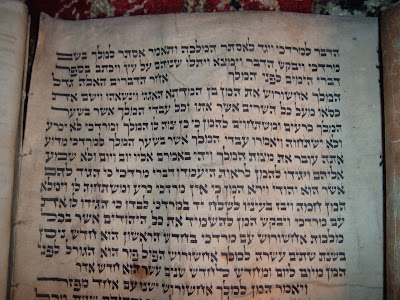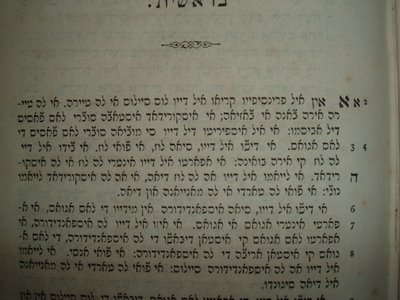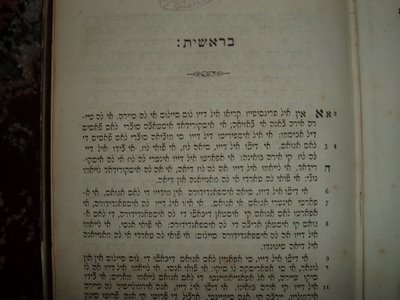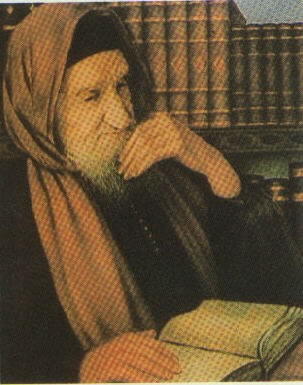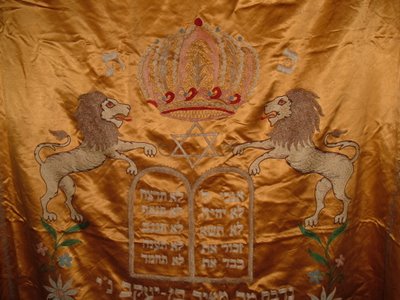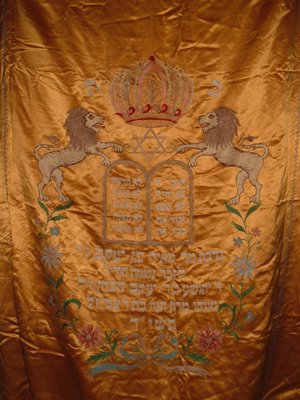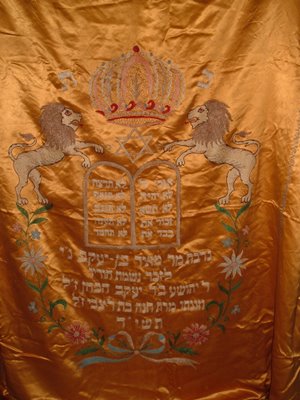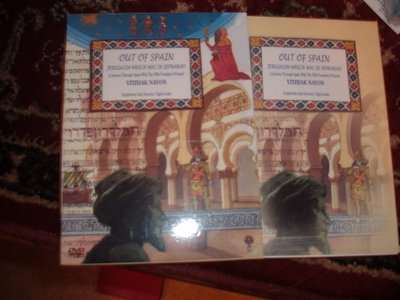 The fascinating story of Nicolau Aguilo of Palma de Mallorca, who returned to his Jewish roots and is now a rabbi living in Shilo, Israel.
The fascinating story of Nicolau Aguilo of Palma de Mallorca, who returned to his Jewish roots and is now a rabbi living in Shilo, Israel.
HaModia Magazine, Passover issue, April 10, 2006
From Nicolau to Nissan: A Jewish Soul Finds its Way Back Home
By Michael Freund As winter gives way to spring, a warm breeze blows through the air, and Rabbi Nissan Ben-Avraham is busy teaching his young pupils at the Talmud Torah in Shilo, Israel, about the liberation of the Jewish people from Egyptian bondage over three millennia ago.
By all accounts, it is a familiar scene, one that is repeated throughout the Jewish world in the weeks leading up to Pesach (Passover). A rabbi and his talmidim (students) recall the miracles that G-d performed for His people, who had endured centuries of suffering and persecution before being delivered from exile.
Only for Rabbi Ben-Avraham, the Pesach story resonates far more deeply, and far more personal, than his students might ever possibly imagine.
With his large kipah and flowing tzitzis (ritual fringes), Rabbi Ben-Avraham has traveled a long way - both geographically and spiritually - since his childhood in Palma de Mallorca, off the coast of Spain.
Born in 1957 into a religious Catholic family, his given name at birth was Nicolau Aguilo. "My father was a shopkeeper, in a shop that has been in our family's hands since 1700, at least," he recalls. "Religion was a very important matter for my family. We went to church every week and fulfilled all the religious duties of Catholicism".
But one day, young Nicolau made an off-handed comment that would end up changing his life forever.
Sitting in the car with his mother, they drove down Jafuda (Yehuda) Cresques Street, which was named after a well-known Jewish cartographer who lived in Palma centuries ago. Nicolau pointed to the street sign and giggled, telling his mother, "He was a Xueta!" (a derogatory word in Catalan, pronounced 'shweta', which is used to refer to the descendants of Mallorcan Jews forcibly converted to Catholicism over five centuries ago).
Nicolau's mother then turned to him and said, "Why are you laughing? You, too, are a Xueta."
The disclosure caught Nicolau completely by surprise. "I was stunned. I remember clearly that for several weeks, all I could think about was: 'Me? I am a Xueta?' You have to understand that this was considered a terrible word, a slur."
The more Nicolau thought about the fact that his family had Jewish roots, the more difficult it was for him to grapple with his entirely new sense of identity. "It was very hard for me. In the Mallorcan Christian mentality, Jews and Xuetas are considered such a terrible thing, so I suddenly had to confront the fact that I came from what was viewed as being the lowest and dirtiest of places in the universe."
Those negative attitudes towards Mallorca's Jews and Xuetas were a product of the centuries of anguish and torment that Nicolau's newly-discovered ancestors had been forced to endure from their unforgiving Catholic neighbors.
No one knows precisely when the first Jews arrived in Mallorca, but the Jewish presence on the island is said to date back possibly as far as the 5th century CE.
At the turn of the 14th century, the Jews' situation deteriorated sharply. In 1305, anti-Jewish rioting erupted, and the island's first blood-libel occurred in 1309, when several Jews were falsely accused of murdering a Catholic child. In 1311, Palma de Majorca's synagogue was confiscated and turned into a church, and Jewish property was seized.
The turning point, however, came in 1391, when violent anti-Jewish pogroms swept across Spain. On August 2, the riots reached Mallorca. Many Jews were massacred and entire communities wiped out, while others were forcibly converted, possibly including Nicolau's forefathers.
Subsequently, the Inquisition became particularly active in the area, and there were numerous cases involving converted Jews who had returned to Judaism being burnt alive at the stake. The Church's harsh tactics led additional Jews, who had arrived in Mallorca after the 1391 massacre, to adopt Christianity under compulsion.
Nonetheless, the native Mallorcans never accepted the Jewish converts and began referring to them as Xuetas, which historians believe is related to the Catalan word for pig.
A particularly brutal incident occurred on the island in 1667, when a boatload of Jews on the way to Leghorn anchored off Mallorca on a brief stopover to purchase supplies. The Inquisitorial authorities seized a 16-year old boy from the ship named Jacobo Lopez after receiving information that his parents had been practicing Judaism in secret. After allowing the rest of the ship's passengers to set sail, they tortured Lopez until he confessed. But the young hero refused to renounce his Jewish beliefs, despite the great danger that he faced. Church authorities subsequently burned him alive in January 1675 in front of some 30,000 spectators and onlookers.
As late as 1691, some three hundred years after the forcible conversions, large numbers of Xuetas were tried and executed by the Inquisition for "relapsing" to Judaism. Despite the passage of so many years, many of them had continued to practice Judaism in secret, marrying only among themselves in an effort to keep alive the faith and heritage of their ancestors.
But discrimination against the Xuetas continued well into the 19th century, and legal restrictions against them were formally lifted only in 1931.
Well-known writers such as the Frenchman George Sand in the 19th century, and Englishman Robert Graves in the 20th, wrote about the Xuetas with a great deal of sympathy, lamenting the hatred and bias to which they were subjected by their fellow Mallorcans.
In 1942, the Xuetas had a brush with death, when the Nazis learned of their existence. They are said to have asked Mallorca's bishop for a list of the Xuetas as part of their campaign to eliminate anyone with "Jewish blood". The bishop is said to have sidestepped the request.
Upon learning that he was connected to the beleaguered and long-suffering group known as Xuetas, Nicolau faced a wrenching choice: to embrace his Jewish birthright or discard it entirely.
But despite his youth, he went on to make a very mature, and ultimately a very significant, decision.
"After some months, I decided to accept the fact as it is, and it was then that I started to research my roots, and to learn more about Jewish history."
Slowly, and somewhat furtively, Nicolau took his first steps on the journey back to his people.
He began reading everything he could find about Jews and Judaism and started visiting Palma's small synagogue every week for Shabbos services. The synagogue, which was maintained by Jewish expatriates from abroad, treated Nicolau well, but he didn't dare to tell his parents what he was doing.
"The way was long and hard, but the Mallorcan Jewish community treated me very well," he remembers. "I got a first-hand experience of the Jewish Sabbath and Jewish culture."
After learning that Jews wear "a special cap" (i.e. a kipah), Nicolau decided he wanted to cover his head, but he was not yet ready to do so in a demonstrative manner. "So I went to my grandma and asked her for a snow hat, so she knitted me a nice one."
"I didn't dare to wear it everywhere," he says, "but on outings such as Scouts' trips or at the synagogue, I was able to appear with my new kippa."
As his attachment to Judaism grew, however, Nicolau found himself facing more and more unexpected difficulties and challenges from his surroundings.
"I was determined to observe as much of Judaism as I could, despite the poor possibilities for doing so in Mallorca, where most of the meals are based on pork or rabbit, both of which are explicitly forbidden by the Torah," he says.
And then there were other issues to face, such as his parents and his schooling. "At that point, I wasn't yet able to explain to my parents all the norms of Judaism. Even after revealing to them my new faith it was quite hard to explain that it requires a new diet and a new atmosphere."
At school, where classes in the Catholic religion were mandatory, Nicolau requested an exemption, which prompted an angry response from the administration. "I asked to be released from the class, but then one of the teachers threatened to expel me from the school." Somehow, his parents managed to intervene and get Nicolau off the hook.
After realizing that his best option for returning to Judaism lay in Israel, he decided that he would make aliyah. He completed his compulsory military duty in Spain and then worked for a short time to earn some money so that he could purchase a plane ticket to the Jewish state.
That, too, proved to be a transformative experience for him. "From the moment I sat on the plane to Tel Aviv, I decided that I'd eat only kosher food," he says.
He arrived in Israel with no specific plans, but he eventually made his way to a religious kibbutz, where he began studying Judaism and Hebrew more intensively.
Nicolau's first visit to Jerusalem left a deep impact on him. While searching for the entrance to the plaza leading to the Kotel, he inadvertently walked up the ramp leading up to the Temple Mount.
"I went to Shalshelet Street in the Old City and stopped before the gate to the Holy Mountain. I was looking for the Kotel when I suddenly realized that I'm standing at the entrance to the holiest place on earth: Mount Moriah, the Temple Mount."
"And then, I asked myself 'why do we pray down there, at the Kotel, and not here, in front of the site of our Temple?'". He then made his way back down and went to the Wall.
In the spring of 1978, Nicolau underwent formal conversion to Judaism by Israel's Chief Rabbinate, assuming the Hebrew name of Nissan, after the Hebrew month in which he underwent his own very personal spiritual revolution.
But his thirst for Jewish knowledge remained intense, and he continued to study Torah, attending Yeshivat Mercaz HaRav in Jerusalem for two years, Yeshivat Ateret Cohanim for several more, and then the yeshiva in Shilo, where he eventually chose to settle and build a family.
In 1991, he received his semicha (rabbinical ordination) from Israel's Chief Rabbinate, marking the first time in centuries that a Xueta had succeeded in achieving the status of a rabbi. He also became a certified Sofer (religious scribe), preparing the parchments used in religious articles such as Tefillin and Mezuzos.
Initially, the drastic changes in his life were met with opposition by his father, Rabbi Ben-Avraham relates. While his siblings "were very kind to me and very understanding of my decisions, with my parents it was quite different," he says.
His father took his return to Judaism "very hard", and initially did not come to visit. "At the time, my father said that he had to take care of his mother, so he couldn't come".
But after Rabbi Ben-Avraham's first son was born, his mother persuaded her mother-in-law to travel to Israel to see the newborn, which "left my father without a pretext, and he came for his first visit."
Before passing away 15 years ago, Rabbi Ben-Avraham's father sent him a letter, "saying that our ways are not so far from each other," which signaled a degree of acceptance that had previously seemed out of reach.
In recent years, Rabbi Ben-Avraham has authored two books in Catalan aimed at a Xueta audience. One, entitled "Els Anussim", explores the attitude toward Xuetas in the rabbinic literature over the centuries, while the other, "La Por", is a historical novel about the massacre and forced conversion of Majorca's Jews in 1391.
Asked what the future holds for Majorca's Xuetas, who are estimated to number as many as 20,000, Rabbi Ben-Avraham declares that action must be taken to return them to the Jewish people.
"It is clear to me that the Jewish world must reach out to them," he says, "for in my opinion many of them are Jews according to Halacha, since there were no intermarriages among them up until the most recent generation, and there is an uninterrupted tradition regarding their identity from the time of the forced conversions of 1391 up until today."
"But with each passing day," he says, sadly, "there are fewer 'Xuetas' in Mallorca. They mix up with gentiles. The message of Judaism is feeble there and few can hear it."
Each week, despite a hectic schedule that includes learning and teaching Torah and caring for his family of 14, Rabbi Ben-Avraham finds the time to sit down and prepare a commentary on the Parsha in Catalan, which he distributes to various Xuetas back in Mallorca.
"We need a real miracle to bring them back to Judaism," he says. "What a terrible waste it would be from G-d's point of view if, after 600 years of suffering and persecution, the Xuetas would not return to Judaism. Although the Bible tells us that the Jews will return in the manner of "one from a city and two from a family", I am hoping for a broader interpretation of the verse."























